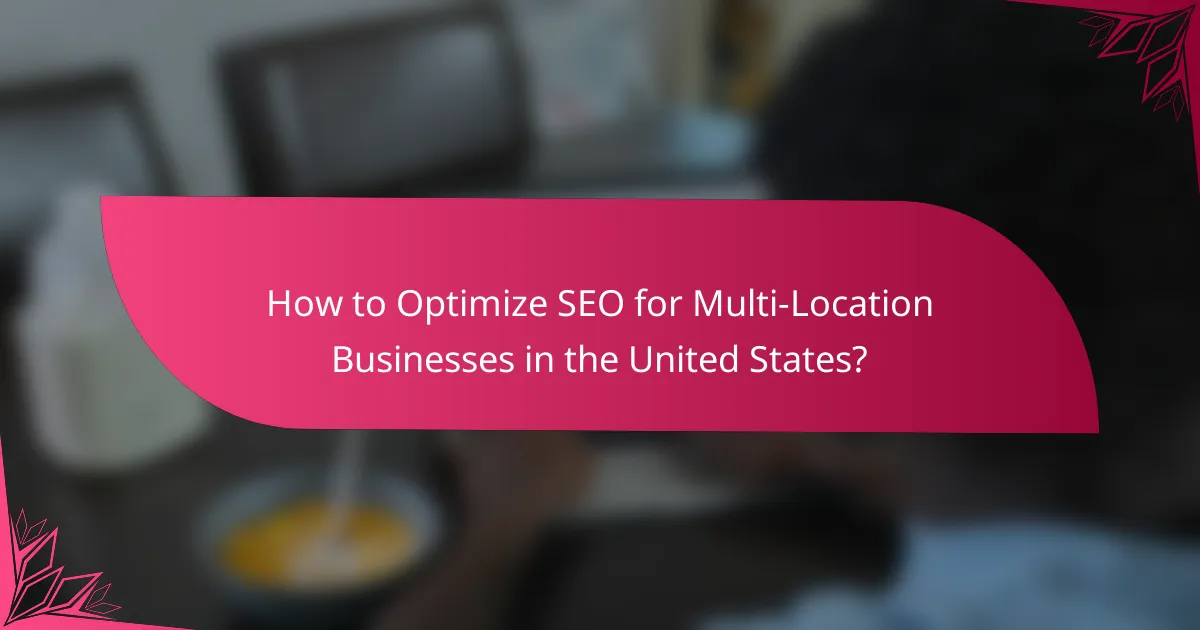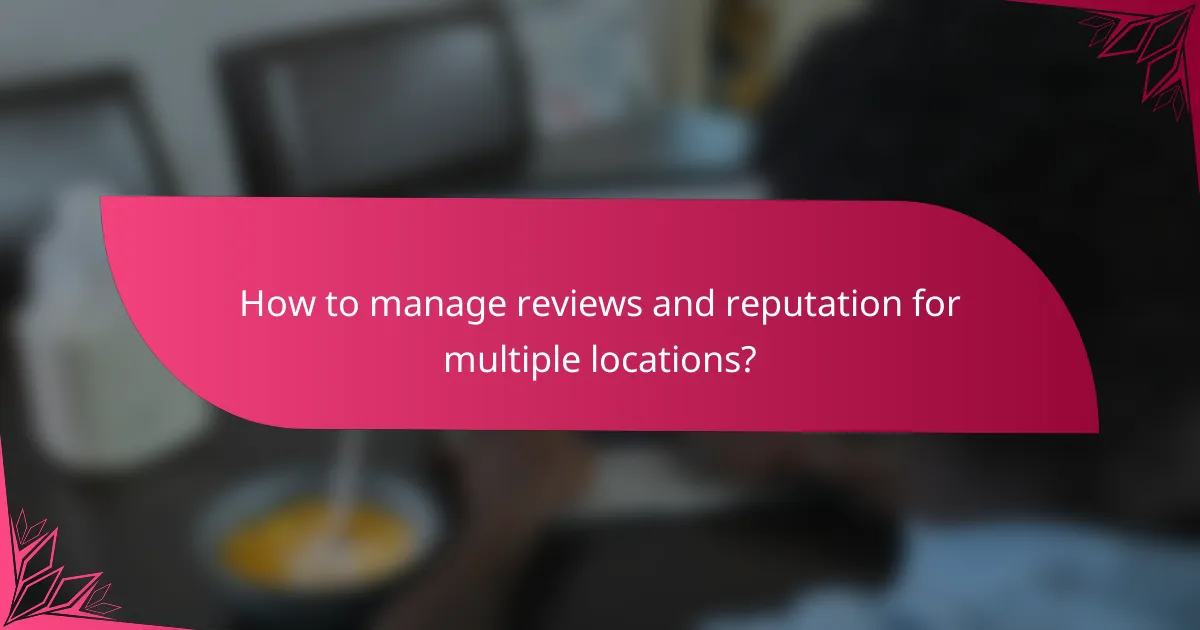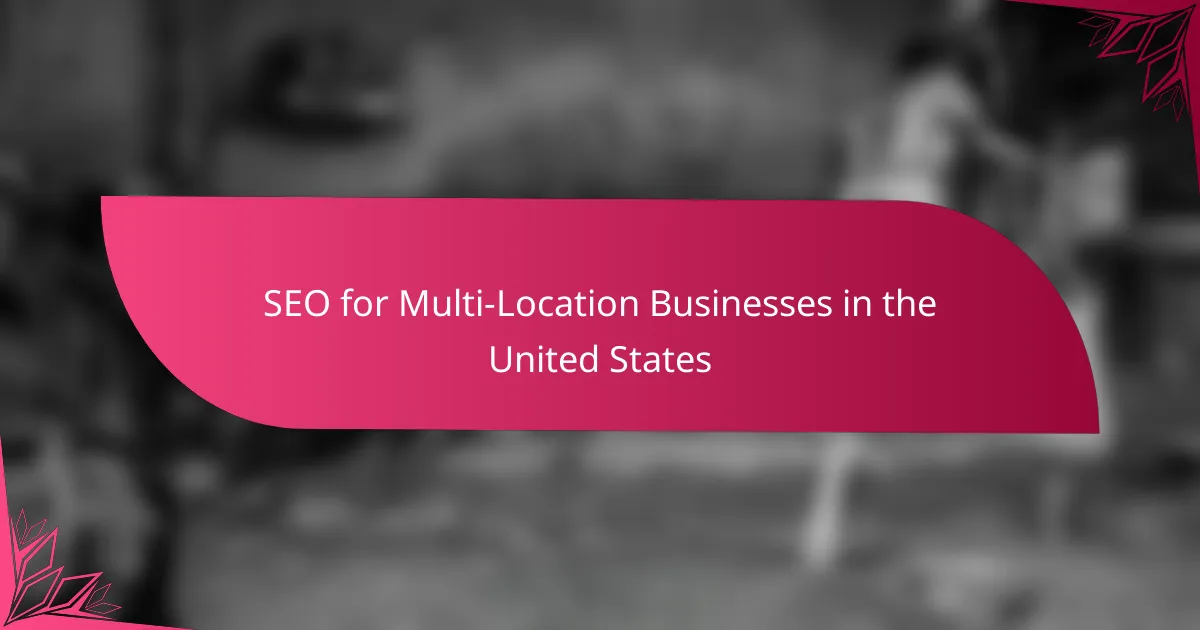Optimizing SEO for multi-location businesses in the United States requires a strategic approach that includes creating localized content and managing Google My Business listings. By focusing on effective local keyword research and maintaining consistent citations, businesses can enhance their visibility in specific markets. Additionally, managing reviews and reputation across multiple locations is essential for fostering a strong online presence and encouraging positive customer engagement.

How to Optimize SEO for Multi-Location Businesses in the United States?
To optimize SEO for multi-location businesses in the United States, focus on creating localized content, managing your Google My Business listings, and ensuring consistent citations across platforms. These strategies enhance visibility in local search results and improve user engagement.
Localized landing pages
Creating localized landing pages is essential for multi-location businesses. Each page should target a specific location, featuring relevant keywords, local landmarks, and tailored content that speaks to the community. This approach helps search engines understand your business’s geographical relevance.
For example, if you operate in several cities, develop unique pages for each city with information about local services, promotions, and customer testimonials. This not only boosts SEO but also provides a personalized experience for users.
Google My Business optimization
Optimizing your Google My Business (GMB) listing is crucial for local SEO. Ensure that each location has its own GMB profile, complete with accurate information like address, phone number, and business hours. Regularly update your listings with new photos, posts, and customer reviews to enhance engagement.
Utilize GMB features such as Q&A and messaging to interact with potential customers. Responding promptly to inquiries can improve your visibility and reputation in local searches.
Schema markup for local SEO
Implementing schema markup helps search engines better understand your business’s location and services. Use local business schema to provide structured data about each location, including address, phone number, and operating hours. This can enhance your search result listings with rich snippets.
Consider using tools like Google’s Structured Data Markup Helper to create and test your schema markup. Proper implementation can lead to improved visibility in local search results and increased click-through rates.
Consistent NAP citations
Maintaining consistent Name, Address, and Phone number (NAP) citations across all online platforms is vital for local SEO. Inconsistencies can confuse search engines and hurt your rankings. Ensure that your NAP information is identical on your website, social media, and directory listings.
Regularly audit your citations to identify and correct discrepancies. Tools like Moz Local or Yext can help manage and monitor your NAP consistency across various platforms.
Targeted local content creation
Creating targeted local content is an effective way to engage your audience and improve SEO. Focus on topics that resonate with local communities, such as local events, news, or customer stories. This not only boosts your relevance but also encourages sharing and backlinks.
Consider starting a blog that highlights local partnerships, community involvement, or industry-specific insights relevant to each location. This strategy can help establish your brand as a trusted local authority and improve your search rankings.

What are the best practices for local keyword research?
Effective local keyword research is crucial for multi-location businesses aiming to enhance their visibility in specific markets. It involves identifying relevant search terms that potential customers use when looking for products or services in their area.
Using Google Keyword Planner
Google Keyword Planner is a powerful tool for discovering local keywords. Start by entering your business type and location to generate a list of relevant search terms along with their search volumes. Focus on keywords that reflect local intent, such as “best pizza in [city]” or “plumbing services near me.”
Utilize the filtering options to narrow down results based on location and competition. This helps in identifying keywords that are not only popular but also feasible to rank for in your specific market.
Analyzing competitor keywords
Examining the keywords that competitors rank for can provide valuable insights. Use tools like SEMrush or Ahrefs to analyze their websites and discover which local keywords drive traffic to them. Look for gaps where you can outperform them by targeting less competitive but relevant terms.
Pay attention to the keywords used in their meta tags, headings, and content. This can inform your own keyword strategy and help you identify opportunities to capture local search traffic.
Leveraging local search trends
Staying updated on local search trends is essential for effective keyword research. Utilize Google Trends to monitor the popularity of specific keywords over time, especially during seasonal peaks or local events. This can help you adjust your strategy to align with current interests.
Additionally, consider using social media platforms to gauge local conversations and trending topics. Engaging with community discussions can reveal emerging keywords that may not yet be widely recognized but are gaining traction.

How to manage reviews and reputation for multiple locations?
Managing reviews and reputation for multiple locations involves a strategic approach to encourage positive feedback, respond effectively to reviews, and monitor your online presence. This ensures that each location maintains a strong reputation while benefiting from collective brand strength.
Encouraging customer reviews
To encourage customer reviews, make it easy for clients to share their experiences. Utilize signage in-store, follow-up emails, and social media prompts to direct customers to review platforms like Google and Yelp.
Consider implementing incentives, such as discounts or loyalty points, to motivate customers to leave feedback. However, ensure that these incentives comply with platform guidelines to avoid penalties.
Responding to reviews effectively
Responding to reviews is crucial for reputation management. Acknowledge positive feedback promptly and thank customers for their support. For negative reviews, address the concerns professionally and offer solutions, demonstrating your commitment to customer satisfaction.
Tailor your responses to reflect the specific location and situation, as this personal touch can enhance customer trust and loyalty. Aim to respond within a few days to show that you value customer input.
Monitoring online reputation
Regularly monitor your online reputation using tools like Google Alerts or reputation management software. These tools can help you track mentions of your business across various platforms, allowing you to stay informed about customer sentiment.
Establish a routine for reviewing feedback and analytics, focusing on trends and common themes. This will help you identify areas for improvement and celebrate successes across your locations, ensuring a consistent brand image.

What tools can help with multi-location SEO management?
Effective multi-location SEO management requires specialized tools that streamline keyword tracking, local audits, and citation management. Utilizing the right tools can enhance visibility across various locations and improve overall search engine performance.
SEMrush for keyword tracking
SEMrush is a powerful tool for tracking keywords across multiple locations. It allows businesses to monitor keyword rankings, analyze competitors, and identify new opportunities tailored to specific regions.
To get started, set up a project for each location and use the Position Tracking feature. This will help you see how your keywords perform in different markets and adjust your strategy accordingly. Regularly review the data to stay ahead of local trends.
BrightLocal for local SEO audits
BrightLocal specializes in local SEO audits, making it an excellent choice for multi-location businesses. It provides insights into local search performance, including rankings, reviews, and citations.
Utilize BrightLocal’s audit tools to assess each location’s SEO health. This includes checking for NAP consistency (Name, Address, Phone Number), local keyword usage, and overall visibility. Regular audits can help identify areas for improvement and ensure compliance with local SEO best practices.
Moz Local for citation management
Moz Local is designed for managing citations across various online directories, crucial for multi-location businesses. It helps ensure that your business information is accurate and consistent across the web, which is vital for local search rankings.
To effectively use Moz Local, claim your listings and regularly update your information. Monitor your citations to prevent discrepancies that could harm your local SEO efforts. Moz Local also provides insights into how your citations stack up against competitors, allowing for strategic adjustments.

What are the common challenges in multi-location SEO?
Multi-location SEO presents unique challenges that can hinder visibility and consistency across various platforms. Businesses must navigate issues such as inconsistent information and the complexities of managing multiple listings effectively.
Inconsistent information across platforms
Inconsistent information across platforms can confuse potential customers and negatively impact search rankings. Businesses must ensure that their name, address, phone number (NAP), and other details are uniform across all online listings, including websites, social media, and directories.
To maintain consistency, regularly audit your listings on major platforms like Yelp, Facebook, and local directories. Use tools like Moz Local or Yext to help manage and correct discrepancies efficiently.
Managing multiple Google My Business listings
Managing multiple Google My Business (GMB) listings is crucial for local SEO success. Each location should have its own GMB profile to ensure accurate representation in local search results and Google Maps.
When creating and optimizing GMB listings, include specific location details, high-quality images, and relevant business categories. Regularly update your listings with new information, such as hours of operation or special offers, to keep them current and engaging.
